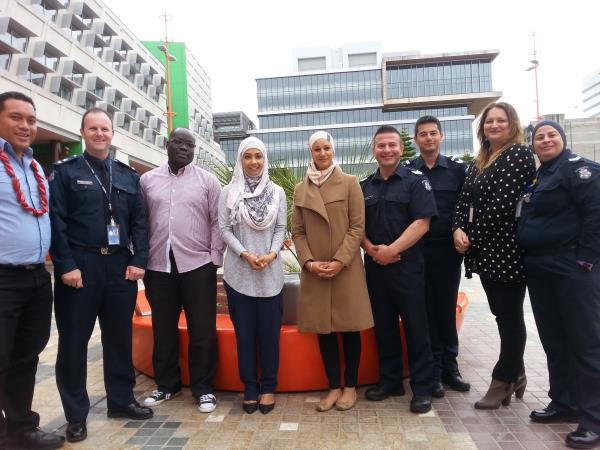
By CAM LUCADOU-WELLS
COMMUNITY leaders recently addressed police on how to better relate to young people and their problems. Three of the leaders spoke to CAMERON LUCADOU-WELLS about the need for a respectful solution.
IT’S late at a public park where a group of 30 to 40 young people from an overseas background are drinking and descending into “argy-bargy”.
Police arrive and they make a heightened risk assessment.
Sometimes by their side is Willy Busari a Sudanese leader and community worker.
He’s seen police handle these scenarios with varying degrees of success.
His advice to police is for calm, not to approach young people as if they’ve committed a crime. Not to say “what are you guys doing here?”
Mr Busari said police had a hard job – especially because some young people “come from different countries where they don’t trust the law”.
“When you talk to them like a human being, the outcome is different.”
Mr Busari said some young people had accumulated “thousands of dollars” in fines for public drinking and that such a regime was blunt and pointless.
“The young people I know don’t even look at (the fine notices) because there are so many, so what’s the point of that?”
Recently Mr Busari, along with six other leaders from “priority communities”, led a workshop for about 100 Victoria Police officers based in Greater Dandenong, Casey and Cardinia.
They were introduced by Superintendent Russell Barrett who oversees the south-east metro region, one of the most culturally diverse regions in Australia.
He hopes all 700 police members in Melbourne’s south-east will sit the workshop.
“I have a strong expectation, and there’s no wavering from it that you treat everyone fairly and with respect,” he told the forum’s officers.
He instructed his members to “listen and learn” – acknowledging the challenge that police faced in working with and among so many cultures and languages.
Anthony Sofe, a Samoan chief and recruitment manager, also spoke at the workshop.
His advice to police is not to just go in “handcuffing” people if there’s a fight at a family event – otherwise “you’ll have the whole family coming towards you”.
Mr Sofe said it’s part of the family oriented culture – which is riled by seeing one of their clan being “mistreated”.
“If you go into a family environment, you need to understand the culture.
“You need to go to the person who’s the head of the family – the chief, the minister of faith or the president of the group.
“Once that person in authority speaks, everyone listens. It makes your job easier.”
There’s a dual-edge to the family hierarchy because respectful youngsters bottle up their frustrations to the point that they get “out of control” when drunk.
“Because of the respect, we won’t complain about our father. When we get out in society, our dad is not there.
“You drink alcohol, you just relax. You get more expressive and violent.
“We have a saying – ‘if you have no words, you speak with your hands’. It’s a bad saying.”
Mr Sofe said police needed to challenge some young people.
What they craved was to respect – and be respected.
“I believe every young person has a chance to make it.
“Even those who come out of jail, I’ll give you a job – I look at you as a brother who needs a second chance.
“I say to them ‘I need one thing from you – to speak to other young people and tell them that jail is not a cool thing’.”
One of Mr Sofe’s concerns is about Pacific Islander youth being recruited by outlaw motorcycle gangs.
“In our community, everyone knows who’s in a gang.
“The gang organises the crimes and they need the muscle – the guys standing at the doors.”
Mr Sofe said the young people were good at heart but were lured by the dollar.
“It’s because of poverty. The factory pays $21 an hour; for a $10,000 debt collection job, you get half.”
Another workshop guest was Muslim community advocate Reem Hakeem of Noble Park who acknowledges young Muslim males’ suspicions about police.
She understands how young male Muslims think police are “out to get them” either because of the police brutality in their homelands or their own sense of isolation.
“They may be regular young people going to school, eating junk food and playing video games.
“Imagine yourself as a 19-year-old or a 20-year-old, they see the Reclaim Australia protests … what they call the anti-Islamisation in Australia calling for no sharia law or no Halal food.
“There are police raids. You wonder are they justified? Then they are sensationalised in the media.
“Politicians like Cory Bernardi and Pauline Hanson say something negative.
“My own 11-year-old asks why do they hate us? It affects them very badly.
“Perhaps it requires police to say – we’re not targeting Muslims, we’re trying to keep everyone safe including yourself.”
Ms Hakeem urged police not to assume they know all Muslims.
An example of the diversity within Islam is the differing protocols for women shaking hands with men.
“If we apply this to all other practices within the Muslim community, they realise this is a very diverse community in itself not a monotheistic group.
“Don’t assume and don’t judge. You may have had experience with a Muslim before but that doesn’t give you knowledge of the person you’re meeting.”
She said she tries to share her appreciation for the police’s challenge – their attempts to accommodate the region’s immense cultural diversity while they “do their job”.
“Police were talking about trying to be more approachable. Saying things like ‘I’m not stopping you for anything other than saying hello’.
“To build that trust takes a lot of work.
“It was fascinating hearing of the police’s own struggles, trying to accommodate all the cultural diversity and do their job.”






